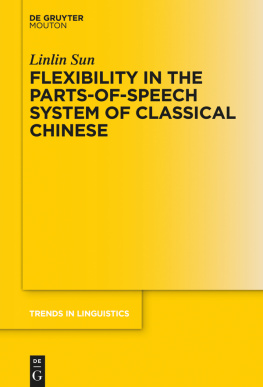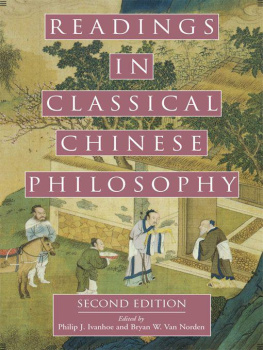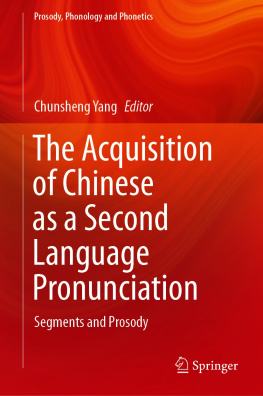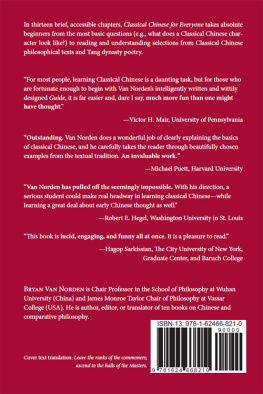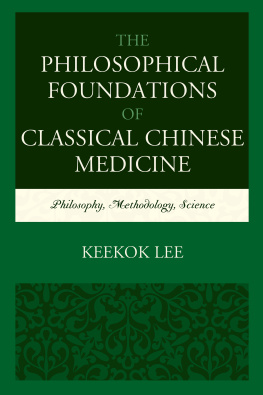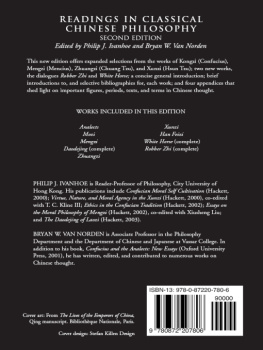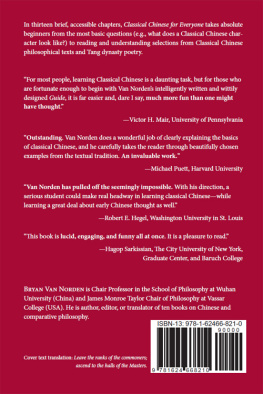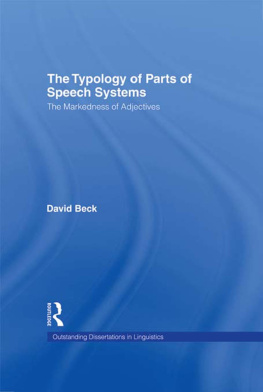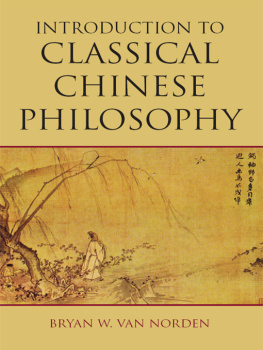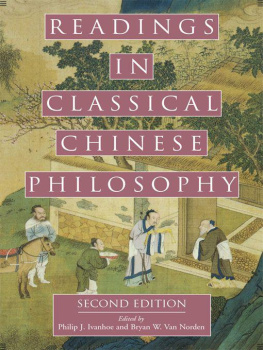Contents
Guide

Linlin Sun
Flexibility in the Parts-of-Speech System of Classical Chinese
Trends in Linguistics Studies and Monographs

Editors
Chiara Gianollo
Danil Van Olmen
Editorial Board
Walter Bisang
Tine Breban
Volker Gast
Hans Henrich Hock
Karen Lahousse
Natalia Levshina
Caterina Mauri
Heiko Narrog
Salvador Pons
Niina Ning Zhang
Amir Zeldes
Editor responsible for this volume
Volker Gast
Volume 23
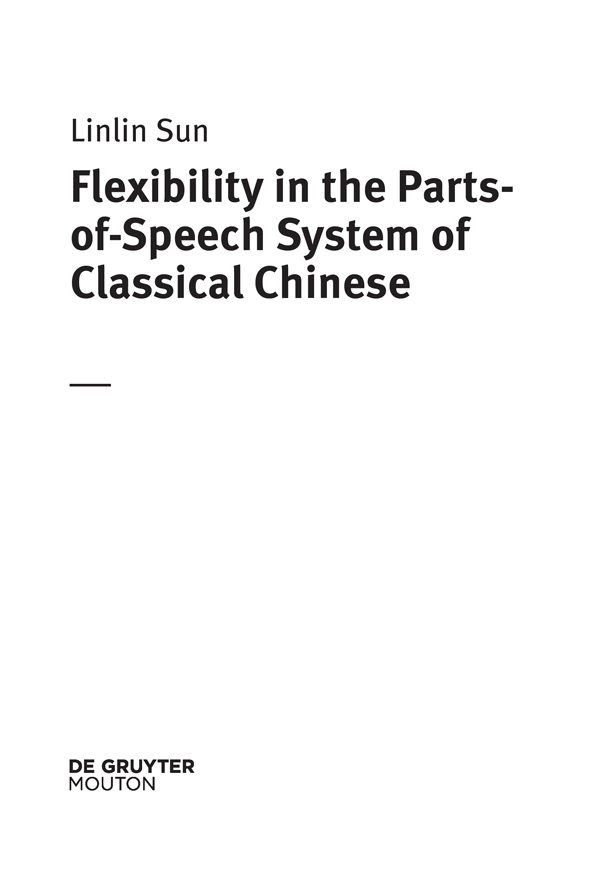
ISBN 978-3-11-063843-1
e-ISBN (PDF) 978-3-11-066079-1
e-ISBN (EPUB) 978-3-11-066087-6
Library of Congress Control Number: 2019956290
Bibliografische Information der Deutschen Nationalbibliothek
The Deutsche Nationalbibliothek lists this publication in the Deutsche Nationalbibliografie; detailed bibliographic data are available on the Internet at http://dnb.dnb.de.
2020 Walter de Gruyter GmbH, Berlin/Boston
www.degruyter.com
Acknowledgements
This book is based on my doctoral thesis, entitled Flexibility in the parts-of-speech system of Classical Chinese: An empirical research based on six Classical Chinese texts, which I submitted in 2015 to the Faculty of Philosophy and Philology at the Johannes Gutenberg University Mainz. Prof. Walter Bisang and Prof. Andrej Malchukov supervised my thesis from 2012 to 2015. Based on reviewers comments, editorial guidance and many valuable suggestions provided by Prof. Volker Gast, for which I am most grateful, I extended and revised certain parts of my thesis, as this book began to take shape.
This book could not have been written without the support of my Doktorvater Prof. Bisang. I would like to sincerely thank him for his guidance, knowledge and wisdom. I still remember how at the beginning of my stay in Mainz, as I was sitting in a seminar room in Philosophicum with the only purpose of improving my German, Mr Bisang showed us how profound linguistics is and how beautiful an abstract concept can be. After having studied Industrial Design and worked for years in the industry, I had not thought that one day I could get in contact with the beauty of language. Mr Bisang opened the door for me. During my entire linguistic studies in Mainz, he always encouraged me to believe in myself and guided me to address new challenges with originality and intellectual rigour .
I would like to thank Prof. Malchukov for agreeing to be my co-advisor during my doctoral studies. I am grateful for his encouragement, practical and always solution-oriented suggestions. I very much appreciate the discussions with him. I should also like to thank all my colleagues from the Department of English and Linguistics and the Faculty of Philosophy and Philology at the University of Mainz. I thank Frau Spahn, Frau Bodenstein and Prof. Dr. Sylvia Thiele. While working on this manuscript I have received their support of several kinds. I am deeply grateful for a stimulating environment in which the basic idea of this book was developed.
There are still many who played a part in making it possible for me to do my research and work on this manuscript. I thank my dear friends. They have extended their help and support in several forms at various times. I thank my friend R. Muralikrishnan for his kindness, helpfulness and for reading early drafts of the manuscript. I thank Shiying, Yaxian, Wenxing and Xuesong. I thank them for being with me, for their trust and confidence, and for all the moments of cheers and tears we spent together. I also want to thank my family, as I would not be who I am today without their love and support.
List of figures
List of tables
List of abbreviations
Linguistics
| 1st | first person |
| 2nd | second person |
| Adj | adjectival |
| Adv | adverbial |
| ANAPH | anaphoric |
| AP | adjective phrase |
| ART | article |
| ATTR | attributive |
| AUX | auxiliary |
| CL | numeral classifier |
| con | control |
| CONJ | conjunction |
| DEM | demonstrative |
| DEP | dependence marker |
| EQ | equational marker / affirmative copula |
| DIR | directive |
| FUT | future |
| GEN | genitive |
| GENR | general tense-aspect-mood particle |
| HON | honorific |
| intr | intransitive |
| LOC | locative |
| MAdv | manner adverb |
| MODEST | modest mood |
| MV | middle voice |
| N | nominal |
| NEG | negation |
| NML | nominalization |
| NP | nominal phrase |
| NP A | actor argument of transitive verbs |
| NP S | actor/doer/undergoer argument of intransitive verbs |
| NP U | undergoer argument of transitive verbs |
| O | object |
| OBJ | object |
| PASS | passive |
| PF | perfect |
| PFV | perfective |
| POSS | possessive |
| PP | prepositional phrase |
| PRED | predicate |
| PREP | preposition |
| PRON | pronominal |
| PST | past |
| PTCL | particle |
| Q | question mark |
| RECIPR | reciprocal |
| REFL | reflexive |
| S | subject |
| SG | singular |
| SVO | subject-verb-object |
| TAM | tense-aspect-mood |
| TOP | topic marker |
| tr | transitive |
| V | verbal |
| VP | verbal phrase |
Chinese terms
| DMT | y shng bi y or s shng bi y Distinguishing meanings by means of (four) tones |
| HY | huyng [liveuse] live use |
| JL | jinli [hold concurrentlycategories] the status of holding concurrently more than one word category |
| JL words | jinlic [hold concurrentlycategoriesword] words that concurrently belong to more than one word category |
| Nominal-verbal words | mngdngc [nominal-verbal-word] words that can be used as semantically related items of either nominal or verbal category |
1Introduction
Languages across the world differ from each other in a number of respects, and one such difference is in terms of how their lexicons are categorized. Compared to many European languages with distinct, functionally dedicated word classes in the traditional sense, quite a few languages are observed to possess lexical items that can fulfil the functions typically associated with more than one traditional word class such as nouns and verbs (e.g., Kinkade 1976; Dixon 1980; Broschart 1991, 1997; Himmelmann 1991; Mosel and Hovdhaugen 1992; Hengeveld 1992a, 1992b, 2013; Gil 1995, 2013; Peterson 2005, 2006, 2013; Don and van Lier 2013; Nordhoff 2013; McGregor 2013). According to Rijkhoff and van Lier (2013), these lexemes exhibit what is called flexibility.

